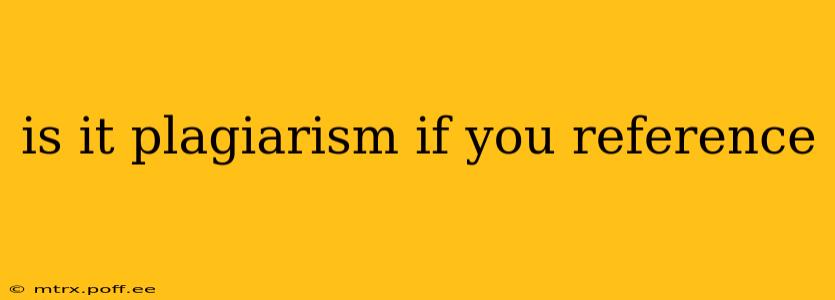Is It Plagiarism If You Reference? Understanding Proper Citation and Academic Honesty
The simple answer is: no, it's not plagiarism if you properly reference your sources. However, "properly referencing" is key, and the nuances can be complex. Plagiarism occurs when you present someone else's work or ideas as your own, without giving them credit. Proper referencing acknowledges the original creators and allows readers to verify your information.
Let's break down the key aspects of avoiding plagiarism when referencing:
What constitutes proper referencing?
Proper referencing involves accurately citing the source of information using a consistent citation style (like MLA, APA, Chicago, etc.). This typically includes:
- In-text citations: Brief references within your text that point to the full citation in a bibliography or works cited page. These citations usually include the author's name and the publication year, or a page number if quoting directly.
- A bibliography or works cited page: A comprehensive list at the end of your work that provides complete details of all sources cited. This allows readers to locate and review the original sources.
Different types of sources require different approaches to referencing: Books, articles, websites, images, videos – each has its own formatting requirements within a chosen citation style.
What are the different types of plagiarism?
Understanding different types of plagiarism can help you avoid unintentional mistakes:
- Direct plagiarism: Copying text word-for-word without quotation marks and proper citation. This is the most blatant form of plagiarism.
- Self-plagiarism: Submitting your own previous work as new work. While it's your own work, it's considered academic dishonesty in many contexts.
- Mosaic plagiarism: Paraphrasing or summarizing someone else's work without proper attribution. Even if you change some words, the core ideas still belong to the original author.
- Accidental plagiarism: This can happen due to poor note-taking or citation practices. It's still plagiarism, even if unintentional.
How can I avoid plagiarism?
- Take thorough notes: Keep track of all your sources and the specific information you're taking from each.
- Paraphrase effectively: Restate information in your own words, ensuring you fully understand the concepts before writing.
- Use quotation marks: When quoting directly, use quotation marks and cite the source correctly.
- Use a citation management tool: Tools like Zotero, Mendeley, or EndNote can help you organize your sources and create citations automatically.
- Understand your institution's plagiarism policy: Familiarize yourself with your school or workplace's guidelines on academic integrity.
- Proofread carefully: Before submitting your work, review it thoroughly to ensure all citations are accurate and complete.
What happens if I plagiarize?
Consequences for plagiarism can be severe, ranging from failing grades and suspension to expulsion from school or loss of employment. It can also damage your reputation and future opportunities.
Is it plagiarism if I use a paraphrasing tool?
While paraphrasing tools can be helpful, they should be used cautiously. Over-reliance on these tools can lead to inaccurate or poorly written paraphrases, and still constitute plagiarism if you don't properly cite the original source. Always review and edit the output of any paraphrasing tool to ensure accuracy and originality.
In conclusion, referencing is essential for academic and professional integrity. Understanding proper citation techniques and diligently following them will prevent plagiarism and ensure the ethical use of others' work. Always prioritize accuracy, honesty, and proper attribution.
